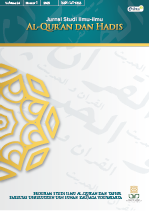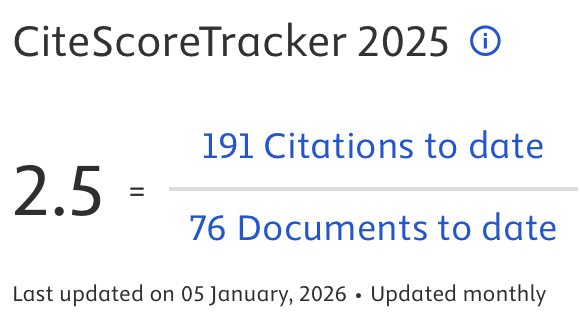Decoding the Cultural Significance of Pengaosan Tafsir Al-Ibriz in Kedawung, Mojo, Kediri: An Analysis of Social Meanings
DOI:
https://doi.org/10.14421/qh.v24i1.3904Keywords:
Pengaosan Tafsir al-Ibriz, Social Meaning, Phenomenology of Social Construction, Religious TraditionAbstract
This study investigates the impact of the tradition of Pengaosan Tafsir al-Ibriz on the socio-religious changes of the Kedawung community. The tradition is seen as a means of promoting social integration in the community, particularly in addressing multi-sectoral problems related to religious observance, cultural reception with religion, and economic cooperation. The research employs a qualitative approach, using observation, interviews, and documentation as data collection techniques, and is guided by the social construction phenomenology approach by Peter L. Berger and the structural functionalism theory by Talcott Parsons. The results show that the tradition of Pengaosan Tafsir al-Ibriz has become a participatory religious tradition that alternates between the residents' houses and has helped to awaken social and transcendental piety, creating a conducive environment and psychological calm. Furthermore, the tradition has strengthened the social integration of the residents by promoting empathy and affection, thereby boosting the economy through cooperation. This study highlights the significance of religious traditions in promoting social integration in communities facing multi-sectoral problems, and provides valuable insights for other communities seeking to promote social integration through religious traditions.
 Abstract viewed: 466 times
|
Abstract viewed: 466 times
|
 PDF downloaded = 385 times
PDF downloaded = 385 times
References
Abidin, Ahmad Zainal, and Thoriqul Aziz. “Javanes Interpretation Of Modernism: Contribution Of Tafsir Al-Ibriz On Moderate Understanding In Sharia And Mu’amalah.” Justicia Islamica 15, no. 2 (2018): 239–263.
Abidin, Ahmad Zainal, Thoriqul Aziz, and Rizqa Ahmadi. “Vernacularization Aspects In Bisri Mustofa’s Al-Ibriz Tafsir.” Jurnal At-Tibyan: Jurnal Ilmu Alqur’an dan Tafsir 7, no. 1 (2022).
Ad-Dimasyqi, Al-Imam Abu Fida Ismail Ibn Katsir. Tafsir Al-Qur’an Al-Adzim. Bandung: Sinar Baru Algesindo, 2000.
Afif. “Al-Ibriz Menyajikan Tafsir Dengan Bahasa Mudah.” al-Burhan 17, no. 1 (2017).
Al-Mahalli, Imam Jalaluddin, and as-Suyuti. Tafsir Jalalain. Bandung: Sinar Baru Algesindo, 2007.
Alfisyah. “Pengajian Dan Transformasi Sosiokultural Dalam Masyarakat Muslim Tradisionalis Banjar.” Komunika: Jurnal Dakwah dan Komunikasi 3, no. 1 (2009): 75–89.
Andriawan, Didik. “Bisri Mustofa ve Al-Ibrīz Li Maʿrifati Tafsīr Al-Qurʾān Al-Azīz Adlı Eseri.” Din ve Bilim - Muş Alparslan Üniversitesi İslami İlimler Fakültesi Dergisi 5, no. 1 (June 21, 2022): 56–74.
Asif, Muhammad, Mudawamah. “Pengajian Tafsir Al-Ibrīz Oleh Kiai Ahmad Mustofa Bisri Di Pondok Pesantren Raudlatut Thalibin Rembang Dalam Perspektif Fenomenologi Agama.” Al Itqan: Jurnal Studi Al-Qur’an 4, no. 2 (2018): 1–26.
Asif, Muhammad. “Tafsir Dan Tradisi Pesantren Karakteristik Tafsir Al-Ibriz Karya Bisri Mustofa.” Suhuf 9, no. 2 (2016).
Aziz, Munawir. “Produksi Wacana Syiar Islam Dalam Kitab Pegon Kiai Saleh Darat Semarang Dan Kiai Bisri Mustofa Rembang.” Afkaruna: Jurnal Ilmu-Ilmu Keislaman 9, no. 2 (2013).
Dhofir, Zamakhsyari. Tradisi Pesantren Studi Pandangan Hidup Kyai Dan Visinya Mengenai Masa Depan Indonesia. Jakarta: LP3ES, 2011.
Fahmi, Izzul. “Lokalitas Kitab Tafsīr Al-Ibrīz Karya KH. Bisri Mustofa.” Islamika Inside: Jurnal Keislaman Dan Humaniora 1, no. 5 (2019).
Geertz, Clifford. Religion as a Cultural System. In M. Bant. London: Tavistock, 1966.
———. Tafsir Kebudayaan. Yogyakarta: Penerbit Kanisius, 1999.
George Ritzer. Teori Sosiologi Modern. Terj. Alim. Jakarta: Kencana Prana Media Group, 2012.
Ghozali, Mahbub. “Kosmologi Dalam Tafsir Al-Ibriz Karya Bisri Mustafa: Relasi Tuhan, Alam Dan Manusia.” Al-Banjari : Jurnal Ilmiah Ilmu-Ilmu Keislaman 19, no. 1 (2020): 112.
Hamid, Nashr. Mafhum Al-Nass Dirasah Fi Ulum Al-Qur’an. Beirut: Markaz al-Tsaqafi al-’Arabi, 1994.
Khumaidi. “Implementasi Dakwah Kultural Dalam Tafsir Al-Ibriz Karya KH. Bisri Mustofa.” Jurnal: An-Nida 10, no. 2 (2018).
Koentjaraningrat. Kebudayaan Jawa. Jakarta: Balai Pustaka, 1984.
Luckmann, P. L. The Social Construction of Reality : A Treatise in The Sociologi of Knowledge. USA: Penguin Books, 1966.
Mansur, Muhammad. Metode Penelitian Living Qur’an Dan Hadis. Sahiron Sy. Yogyakarta: TH Press, 2007.
Maslukhin. “Kosmologi Budaya Jawa Dalam Tafsir Al-Ibriz Karya KH. Bisri Mustofa.” Mutawatir: Jurnal Keilmuan Tafsir Hadis 5, no. 1 (2015).
Mubasirun, Mubasirun. “Values of Tepo Seliro in Bakri Syahid’s Tafsir Al-Huda and Bisri Mustofa’s Tafsir Al-Ibriz.” Indonesian Journal of Islam and Muslim Societies 11, no. 2 (December 8, 2021): 351–376. Accessed July 29, 2022.
Muhsin, Imam. Tafsir Al-Qur’an Dan Budaya Lokal: Studi Nilai-Nilai Budaya Jawa Dalam Tafsir Al-Huda Karya Bakri Syahid. University of California, Berkeley: Badan Litbang Dan Diklat, Kementrian Agama RI, 2010.
Murtopo, Ali Bahrun. “Tradisi Pengajian Lapanan Dalam Atifitas Sosial Masyarakat.” Ar-Rihlah: Jurnal Inovasi Pengembangan Pendidikan Islam 5, no. 1 (2020): 155–179.
Mustafa, Bisyri. Al-Ibriz Al-Ma’rifatu Tafsiri Al-Qur’an Al-’Aziz. Kudus: Menara Kudus, 1959.
Muwaffaq, Moh Mufid. “Modernisme Dalam Tafsir Tradisionalis: (Nuansa Tafsir ‘Ilmī Dalam Tafsīr Al-Ibrīz Karya Bisri Musthafa).” QOF: Jurnal Studi Al-Qur’an dan Tafsir 4, no. 1 (2020): 75–90.
Robinson, Neal. Discovering the Qur’an: A Contemporary Approach to a Veiled Text. 2nd ed. London: SCM Press, 2003.
Saeed, Abdullah. The Qur’an; An Introduction. Canada: Routledge, 2008.
Sulandari, Santi, Mei Wijayanti, and Ria Dessy. “Keterlibatan Lansia Dalam Pengajian: Manfaat Spiritual. Sosial, Dan Psikologis.” indigenous: Jurnal Ilmiah Psikologi 1, no. 2 (2017): 42–55.
Zaid, Nashr Hamid Abu. Al-Imam Al-Syafi Wa Ta’sisu Al-Idiyulujiyyah Al-Wasatiyyah. Beirut: Al-Markaz al-Tsaqafi al-’Arabi, 2007.
———. Naqd Al-Khithab Al-Din. Cet. 3. Beirut: Al-Markaz al-Tsaqafi al-’Arabi, 2007.
Zuhri, Ari Hidayaturrohmah Saifuddin. “Unsur-Unsur Budaya Jawa Dalam Kitab Tafsir Al-Ibriz Karya KH. Bisri Mustofa.” Hermeneutik 14, no. 2 (2020): 283–306.
Downloads
Published
How to Cite
Issue
Section
License
Copyright (c) 2023 Ubaidillah Baydi, Laitsa Nailul Husna

This work is licensed under a Creative Commons Attribution-NonCommercial-NoDerivatives 4.0 International License.
Publishing your paper with Jurnal Studi Ilmu-ilmu al-Qur'an dan Hadis means that the author or authors retain the copyright in the paper. Jurnal Studi Ilmu-ilmu al-Qur'an dan Hadis uses license CC-BY-NC-ND or an equivalent license as the optimal license for the publication, distribution, use, and reuse of scholarly works. This license permits anyone to copy and redistribute the material in any medium or format and must give appropriate credit, provide a link to the license, and indicate if changes were made. If you remix, translate, transform or build upon the material you may use it for private use only and not for distribution. Jurnal Studi Ilmu-ilmu al-Qur'an dan Hadis granted an exclusive non-commercial reuse license by the author(s), but the author(s) are able to put the paper onto a website, distribute it to colleagues, give it to students, use it in your thesis, etc, so long as the use is not directed at a commercial advantage or toward private monetary gain. The author(s) can reuse the figures and tables and other information contained in their paper published by Jurnal Studi Ilmu-ilmu al-Qur'an dan Hadis in future papers or work without having to ask anyone for permission, provided that the figures, tables, or other information that is included in the new paper or work properly references the published paper as the source of the figures, tables or other information, and the new paper or work is not direct at a private monetary gain or commercial advantage.
Jurnal Studi Ilmu-ilmu al-Qur'an dan Hadis journal Open Acces articles are distrubuted under the Creative Commons Attribution-NonCommercial-NoDerivatives 4.0 International (CC BY-NC-ND 4.0). Article can be read, copy and redistribute the material ini any medium or format under the following conditions:
Attribution — You must give appropriate credit, provide a link to the license, and indicate if changes were made. You may do so in any reasonable manner, but not in any way that suggests the licensor endorses you or your use.
NonCommercial — You may not use the material for commercial purposes.
NoDerivatives — If you remix, transform, or build upon the material, you may not distribute the modified material.










